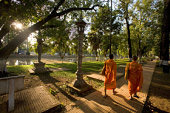Inspirational Articles
Featured Articles
 Dead Men Walking
Dead Men Walking
By Dr. Monte Wilson
One of our strongest instincts is self-preservation: the survival instinct. We will do most anything to save our lives. On one hand, this is a healthy impulse for it keeps us from playing Russian roulette with .45 caliber handguns, drinking poison or telling our boss what we really think of him. On the other hand, this instinct can go from preserving our life to defending our ego.
The ego prefers remaining in its intellectual-psychological comfort zone to facing the challenges of new choices, new learning and new perspectives. Somehow I want to be different—without being different! I want to get from here to there while remaining here. And, above all else, I certainly do not want to stand out and appear strangely different from my peers. But really now, do corpses care what they look like?
 Lao Tzu wrote, “Those who know how to live can walk abroad without fear of rhinoceros or tiger. They can enter battle without being wounded. The rhinoceros can find no place to thrust its horn, the tiger no place to use its claws, and weapons no place to pierce.” Why is this? Because they are “beyond death.” (Tao Te Ching 50) And how do we get “beyond death”? We die.
Lao Tzu wrote, “Those who know how to live can walk abroad without fear of rhinoceros or tiger. They can enter battle without being wounded. The rhinoceros can find no place to thrust its horn, the tiger no place to use its claws, and weapons no place to pierce.” Why is this? Because they are “beyond death.” (Tao Te Ching 50) And how do we get “beyond death”? We die.
 The discipline of death requires that we see ourselves as dead to the old ways of believing and behaving. This doesn’t mean that some of what we have learned in the past will not serve us in our Quest: it does mean that such learning will need to be evaluated and inspected for beliefs, values and attitudes that would impede our journey.
The discipline of death requires that we see ourselves as dead to the old ways of believing and behaving. This doesn’t mean that some of what we have learned in the past will not serve us in our Quest: it does mean that such learning will need to be evaluated and inspected for beliefs, values and attitudes that would impede our journey.
The discipline of death also serves to maintain a long-term perspective on my present choices. In light of the fact that I am going to die, which choice will be the most efficacious, the most advantageous for my life’s journey? Which choice, which path, will maximize and stretch me? Which path has more heart in it?
 The blessing of our mortality is that we are constantly faced with the challenge of choices. Do I do this with my allotted time or do I do that? The danger is in forgetting our mortality and living as if we have all the time in the world. It is best to see our selves as always standing in the shadow of our own gravestone and asking, what now?
The blessing of our mortality is that we are constantly faced with the challenge of choices. Do I do this with my allotted time or do I do that? The danger is in forgetting our mortality and living as if we have all the time in the world. It is best to see our selves as always standing in the shadow of our own gravestone and asking, what now?
This is not merely an intellectual concept to which we acquiesce. If we do not get this, if we do not chose to allow our soul to fully embrace that “I am a dead man walking,” then we will refuse to press beyond the safe and comfortable…toward a path filled with possibilities for adventure and significance. w
Who We Are
- About Us
- Why God On the Net
- Contact Us
- Privacy Statement
- Ten Ways This Site Can Change Your Life
- Why We Are Able To Help